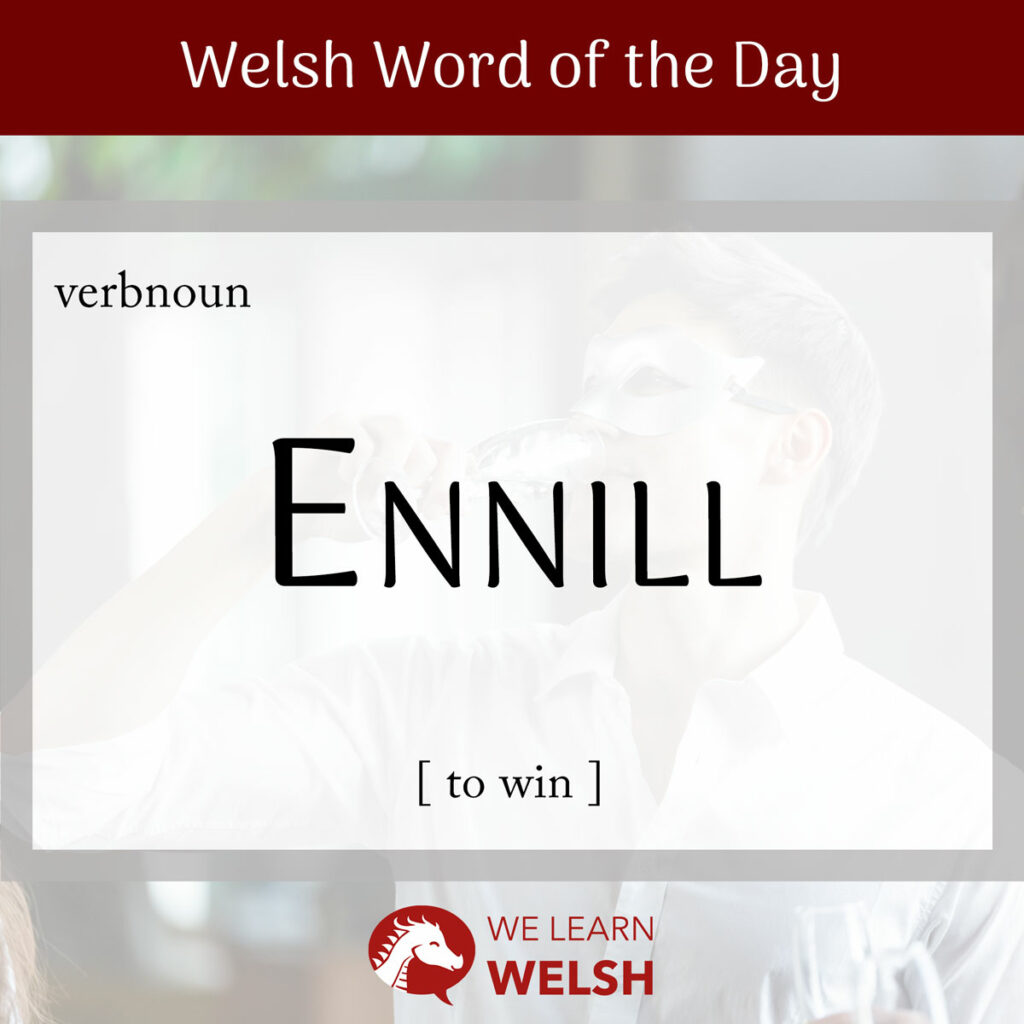The word ennill is a good example of how languages can’t always be easily mapped onto each other, as there’s no one English word that sums up all of its meanings. Ennill means to earn, to win, or to gain.
ennill
to earn / to win / to gain
We don’t know what the exact etymology of ennill is. It’s likely that the first syllable, en-, was added over time as a prefix, creating positive emphasis, but what root the –nill part of the word derives from is unknown.
Alternative spellings have also been recorded throughout the word’s written history, such as spelling it with only one n or replacing the initial e with a y.
You may also sometimes see it written hennill. This isn’t a different spelling, however. This happens when ennill is subject to the Welsh grammatical phenomenon of h-prosthesis, where an h is added to the beginning of words under certain circumstances. Try not to worry about it too much, as it doesn’t come up that often and is even sometimes omitted in colloquial speech.
Rhaid i bawb ennill bywoliaeth.
Everyone has to earn a living.
There are not really any other Welsh verbs that mean earn, although haeddu, to deserve, could fill in for it in some circumstances. Similarly, to win can only really ever be translated as ennill.
But there are various other words that refer to gaining, getting, or acquiring, including:
- cael = to get
- caffael = to get (literary)
- derbyn = to receive / to accept
- cipio = to snatch
- adennill = to regain / to recover
- elwa = to profit
Although the range of meanings this term covers is broad, there are two main ways you might want to use it in your everyday life and conversations.
One is when talking about ennill cystadleuaeth (winning a competition) or ennill ras (winning a race). And if you’re initially an underdog in the ras but began to catch up to whoever’s in first place, spectators will be sure to comment as you ennill ar / ennill y blaen ar (gain on) your opponent.

When you’re declared the enillydd / enillwr (winner) of whatever contest you took part in, you may even be awarded a gwobr (prize), troffi (trophy), or medal (medal). If you are judged the best bardd (poet) in an eisteddfod, you can even ennill the highly coveted cadair (chair).
The other really common usage is when talking about ennill arian (earning money), which is generally done by gweithio (working) in a swydd (job). If you’re doing well for yourself in your gyrfa (career), you might be described as bod ar eich ennill (being on your win).
In English some people jocularly describe this as earning your bread and butter or putting food on the table. In Welsh the equivalents are ennill eich bara a chaws (earning your bread and cheese) or ennill eich tamaid / toc (earning your snack / earning your bite to eat).
Mae hi wedi ennill y gadair yn yr Eisteddfod.
She has won the chair at the Eisteddfod.
Here are some more useful phrases in which ennill turns up:
- ennill pwysau = to gain weight
- ennill plwyf = to earn respect
- ennill gwres = to warm up (for exercise)
- ennill y dydd / ennill y maes = to win the day
- ennill lle = to make a name for oneself
- ennill tir = to gain ground
- ennill clust = to gain someone’s ear
- ennill plant = to have children (very old-fashioned, literary)
We can also use ennill as a noun, although this is less common day to day. It’s masculine, and its plural is ennillion.
In this sense it is similar to gain as a noun, and might be used in different contexts to refer to earnings, profit, or produce. It could also be used as a synonym of buddugoliaeth (victory), as could the derived term enilliad.
Colled is loss, so profit and loss in a financial sense is ennill a cholled. This word, colled, is closely related to the verb colli, to lose or to miss, which is the direct antonym of ennill. (Another important antonym is methu, which means either to fail or to be unable).
Llongyfarchiadau i John am ennill dysgwr y flwyddyn!
Congratulations to John for winning learner of the year!
Ennill and colli realistically go together in many situations in life, and you can’t experience one without at some point coming face to face with the other. This is conveyed by the Welsh idiom ennill ar y menyn a cholli ar y caws (winning on the butter and losing on the cheese). It’s nice to think that everything we colli opens the door to ennill something new.

